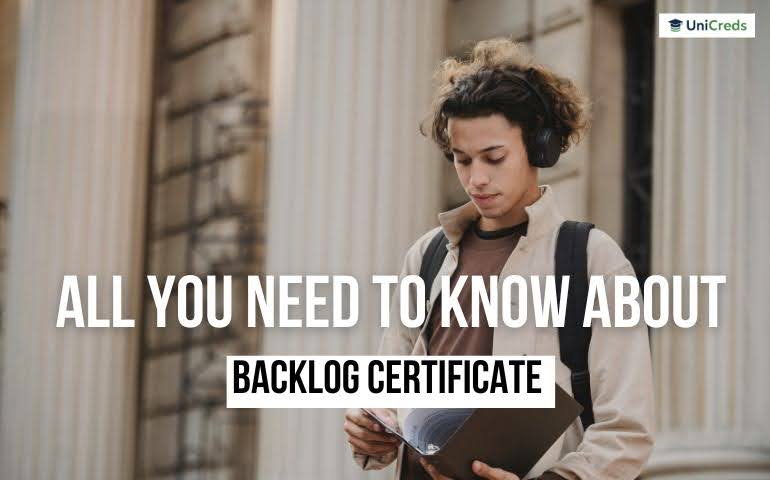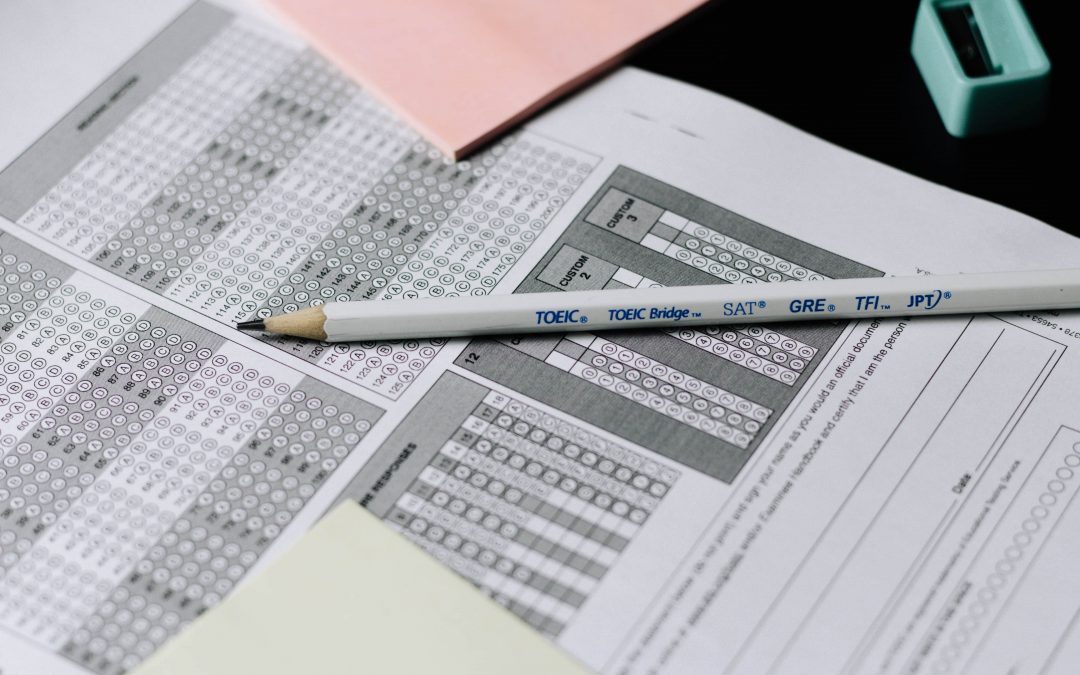Table of Contents
When applying to universities abroad, every academic detail matters, including your backlog history.
Many international institutions require a backlog certificate to verify the number of failed or repeated subjects during your course and confirm whether they have been cleared.
This document goes beyond transcripts, offering a transparent view of your academic performance and helping universities make fair admission decisions.
Understanding what a backlog certificate is, its types, and its importance can save you from last-minute application hurdles.
What Is A Backlog Certificate?
A backlog certificate is an official document provided by your university or college that states the total number of backlogs (failed or uncleared exams) during your academic course.
Universities abroad commonly require verification of your educational history in detail, beyond what is shown in your transcripts.
What Does a Backlog Certificate Include?
The certificate lists both cleared and uncleared backlogs, along with details like:
- Subject names and codes
- Number of attempts made
- Status (cleared/uncleared)
- Academic year or semester in which the backlog occurred
This helps institutions confirm your academic performance and eligibility for admission.
Types Of Backlog Certificate

Backlog certificates are issued in different formats depending on what details universities or employers require. Each type serves a specific purpose, from summarising your overall backlog history to providing detailed breakdowns by subject, semester, or number of attempts.
Understanding these types can help you request the right certificate based on your application needs.
| Type of Backlog Certificate | Description |
| Semester-Wise Certificate | Lists backlogs semester by semester, detailing subjects failed or cleared in each term. Helpful in tracking performance term-wise. |
| Subject-Wise Certificate | Focuses on specific subjects where the student had backlogs, regardless of semester, listing all such subjects. |
| Cumulative Certificate | Provides a summary of all backlogs across the entire course duration; often used by universities during admissions. |
| Attempt-Wise Certificate | Shows the number of attempts taken to clear each subject and when they were passed, relevant in countries where attempts matter. |
| Consolidated Certificate | Offers an overview of all backlogs over multiple semesters or years in one single document. |
| Single Subject Backlog Certificate | Issued when there is a backlog in only one subject. |
| Multiple Subject Backlog Certificate | Issued when there are backlogs in more than one subject. |
Importance Of A Backlog Certificate For Studying Abroad
While you submit your documents to a university abroad, you will need to attach a backlog certificate along with your LORs, SOPs, CV and academic transcripts.
A backlog certificate is important for studying abroad because it serves as an official and transparent declaration of your academic history related to backlogs (subjects not cleared on the first attempt). Its main importance lies in several key areas:
- Admission Evaluation
Universities abroad often require a backlog certificate during admissions to verify the number of backlogs, the subjects involved, and the number of attempts taken to clear them. This helps the admissions committee assess your academic consistency, performance, and your ability to overcome challenges. It complements academic transcripts by providing focused details about backlogs, which aids in making informed admission decisions
- Transparency and Credibility
The certificate acts as a reliable document issued by your previous institution, ensuring honesty about your academic record. This transparency allows universities to fully understand your academic progress, including any difficulties faced and how you addressed them, which can positively influence admission decisions.
- Visa and Immigration Processing
Immigration authorities and visa officers often need to verify your academic background thoroughly. A backlog certificate helps demonstrate your academic history transparently, which can affect the attractiveness and success of your visa application.
- Eligibility Confirmation
Different countries and universities have varying policies regarding the number of backlogs tolerated. The backlog certificate helps determine if you meet the eligibility criteria for admission, with some universities allowing a limited number of backlogs and others preferring candidates with none.
- Required Even If No Backlogs
Many universities, especially in countries like Canada, the USA and Australia, ask for a No Backlog Certificate (or Zero Backlog Certificate) as proof that you have cleared all courses successfully on the first attempt, thereby confirming your clean academic record.
How Do You Apply For A Backlog Certificate?
You must request a backlog certificate from your previous university or college. Most institutions are aware of this requirement and have a standard process in place.
Write a formal application addressed to the Principal, Dean, or Registrar, clearly mentioning your full name, roll number, course, batch/year, and purpose (e.g., applying for higher studies abroad). If required, include a brief table of backlog details such as subjects, semesters, number of attempts, and clearance dates.
Submit the application in person, via email, or through the university’s portal. Check if a nominal fee is applicable and confirm the payment process. After submission, track your request and follow up if there are delays.
Difference Between A Backlog Certificate And A Transcript
A backlog certificate and an academic transcript are two different documents that universities require.
Below, we have listed the key differences between the two.
| Aspect | Backlog Certificate | Academic Transcript |
| Purpose | Certifies the number of backlogs (failed subjects) and attempts made to clear them. | Provides a complete academic record including all courses taken and grades received. |
| Content | Focuses only on subjects where the student had backlogs, details of attempts, and status of clearance. | Lists all courses taken, the grades received, credit hours, GPA, and overall academic performance. |
| Issued by | Typically issued by the university’s examination or administrative department upon request. | Usually issued routinely by the university or ministry of education as official academic documentation. |
| Format | Specific to backlog-related information, often includes attempts, semester-wise or subject-wise breakdown of backlogs. | Comprehensive and standardised format listing all academic results and cumulative performance. |
| Requirement | Required when universities ask for detailed backlog information or a no-backlog declaration in addition to transcripts. | Always required as the primary proof of academic achievement and course completion. |
Also Read: What Are Academic Transcripts & How to Get Them? (2025)
Backlog Certificate Samples
1. Simple Backlog Certificate (No Backlogs)
University Name & Logo
Certificate of No Backlogs
This is to certify that [Student Name], Roll No. [Roll Number], has completed the [Course Name] (Batch: [Year-Year]) at [University Name].
It is further certified that the student has completed her Bachelor’s/ Master’s degree with no backlogs during the entire course of study and has cleared all subjects in the first attempt.
Date: [DD/MM/YYYY]
Seal & Signature
Contact Number
2. Backlog Certificate (With Cleared Backlogs)
University Name & Logo
Backlog Certificate
This is to certify that [Student Name], Roll No. [Roll Number], enrolled in the [Course Name] (Batch: [Year-Year]), had the following backlogs during their course of study:
| Semester | Subject Name & Code | Attempts | Status |
| 2nd Semester | Engineering Mathematics (MTH201) | 2 | Cleared |
| 4th Semester | Thermodynamics (ME204) | 1 | Cleared |
All the above backlogs have been cleared successfully as of [Date].
Date: [DD/MM/YYYY]
Seal & Signature
Contact Number
A backlog certificate is an important document for students planning higher studies abroad, as it provides clarity and credibility to your academic profile. Whether you have cleared backlogs or have a zero-backlog record, presenting this certificate ensures a smoother admission and visa process.
If you are planning your study abroad journey and need guidance on finances, scholarships or education loans, UniCreds can help you secure the best options with low interest rates and minimal paperwork.
FAQs
1. Where can I get a backlog certificate?
You can get a backlog certificate from the examination or administrative department of your college or university, as they are the issuing authority. Submit a formal application or request online (if available), and they will provide the certificate after verification.
2. What is a backlog document?
A backlog document is an official certificate from your university or college that confirms the number of backlogs you have had during your course, along with their clearance status. It is commonly required by foreign universities to ensure transparency about your academic record during admissions.
3. What is the significance of a backlog certificate?
The significance of a backlog certificate lies in its ability to provide transparent proof of your academic history, especially regarding failed or repeated subjects. It is crucial for university admissions abroad, visa processing, and eligibility checks, as it helps institutions assess your academic consistency and confirm whether you have cleared all backlogs or have a clean record.




![60+ Extempore Topics for Students in 2025 [Speak Confidently]](https://cdn.unicreds.com/blog/wp-content/uploads/2025/06/22121909/extempore-topics-for-students-1080x675.webp)





0 Comments